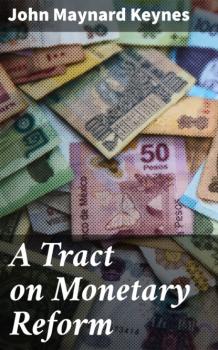John Maynard Keynes
Список книг автора John Maynard KeynesA Tract on Monetary Reform
"A Tract on Monetary Reform" by John Maynard Keynes. Published by Good Press. Good Press publishes a wide range of titles that encompasses every genre. From well-known classics & literary fiction and non-fiction to forgotten−or yet undiscovered gems−of world literature, we issue the books that need to be read. Each Good Press edition has been meticulously edited and formatted to boost readability for all e-readers and devices. Our goal is to produce eBooks that are user-friendly and accessible to everyone in a high-quality digital format.
Essays in Persuasion
"Essays in Persuasion" by John Maynard Keynes. Published by Good Press. Good Press publishes a wide range of titles that encompasses every genre. From well-known classics & literary fiction and non-fiction to forgotten−or yet undiscovered gems−of world literature, we issue the books that need to be read. Each Good Press edition has been meticulously edited and formatted to boost readability for all e-readers and devices. Our goal is to produce eBooks that are user-friendly and accessible to everyone in a high-quality digital format.
A Revision of the Treaty
"A Revision of the Treaty" by John Maynard Keynes. Published by Good Press. Good Press publishes a wide range of titles that encompasses every genre. From well-known classics & literary fiction and non-fiction to forgotten−or yet undiscovered gems−of world literature, we issue the books that need to be read. Each Good Press edition has been meticulously edited and formatted to boost readability for all e-readers and devices. Our goal is to produce eBooks that are user-friendly and accessible to everyone in a high-quality digital format.
Krieg und Frieden
Mit seinem Buch über die Folgen des Ersten Weltkriegs für Europa wurde John Maynard Keynes über Nacht ein berühmter Mann. Niemand hat prophetischer analysiert, warum der Vertrag von Versailles einen neuen Krieg und bis heute schwelende politische Konflikte auslösen konnte. Keynes' glänzend geschriebene Polemik, von Joachim Kalka neu übersetzt, enthält die Darstellung der nie wieder erlangten Höhe von Europas Reichtum vor 1914 und den Ausblick auf die wenig hoffnungsvolle Nachkriegszeit. Kein anderer hat so anschaulich und mit analytischem Spott beschrieben, wie 1919 der Frieden verspielt und Europa unabsehbarer Schaden zugefügt wurde.
The Economic Consequences of the Peace
John Maynard Keynes (1883-1946) was a British economist whose theories had a profound impact on twentieth century history and economic practice. Born and raised in Cambridge, England to highly successful, intelligent parents John and Florence Keynes, he attended Eton and King's College, Cambridge where he joined the intellectual group called «The Apostles» with the likes of Leonard and Virginia Woolf, E. M. Forster and Bertrand Russell. After attending the Paris Peace Conference as economic advisor to Prime Minister Lloyd George, Keynes resigned from a prominent position in the Treasury and published «The Economic Consequences of the Peace» (1919), a stinging indictment of the Versailles Treaty. Keynes expressed his opposition to the political practices that were taking place, and the work gained him instant notoriety. The impact of this, and other, works on economic method, theory and policy led to what is now termed the «Keynesian Revolution» of the twentieth century, and helped shape modern macroeconomics.
The Economic Consequences of the Peace
John Maynard Keynes was a British economist whose theories had a profound impact on twentieth century history and economic practice. Born and raised in Cambridge, England to highly successful, intelligent parents John and Florence Keynes, he attended Eton and King’s College, Cambridge where he joined the intellectual group called “The Apostles” with the likes of Virginia Woolf, E. M. Forster, and Bertrand Russell. In 1919, after attending the Paris Peace Conference as economic advisor to Prime Minister Lloyd George, Keynes resigned from a prominent position in the Treasury and published “The Economic Consequences of the Peace”, a stinging indictment of the Versailles Treaty. Keynes expressed his opposition to the political practices that were taking place, and the work gained him instant notoriety. The impact of this, and other, works on economic theory and policy led to what is now termed the “Keynesian Revolution” of the twentieth century, and helped shape modern macroeconomics.
The Economic Consequences of the Peace
In 1919, Keynes participated in the negotiations of World War I's armistice. He strongly disagreed with terms of reparation imposed on Germany, arguing in this controversial book that German impoverishment would threaten all of Europe. This prophetic view of the European marketplace in the early 20th century represents a much-studied landmark of economic theory.
Das Ende des Laissez-faire. Mit einem Essay von Nikolaus Piper.
Kernprobleme unserer Zeit: Was soll der Staat tun? Was muss der Staat tun? Was sollte er besser lassen? Und was vermag die Wirtschaft? John Maynard Keynes zählt zu den bedeutendsten Ökonomen des 20. Jahrhunderts. Bis heute ist der «Keynesianismus» von großem Einfluss auf die Wirtschaftspolitik. Die neoklassische Theorie, dass die Märkte schon alles von sich aus richten würden, griff er scharf an: Dies sei nicht richtig, sondern nur einfach gedacht und deshalb so erfolgreich. Der Essay gehört «in seiner ganzen Unvollkommenheit», wie Nikolaus Piper in seinem Essay zusammenfasst, «zu den wichtigsten Dokumenten in der Geschichte des ökonomischen Denkens».









